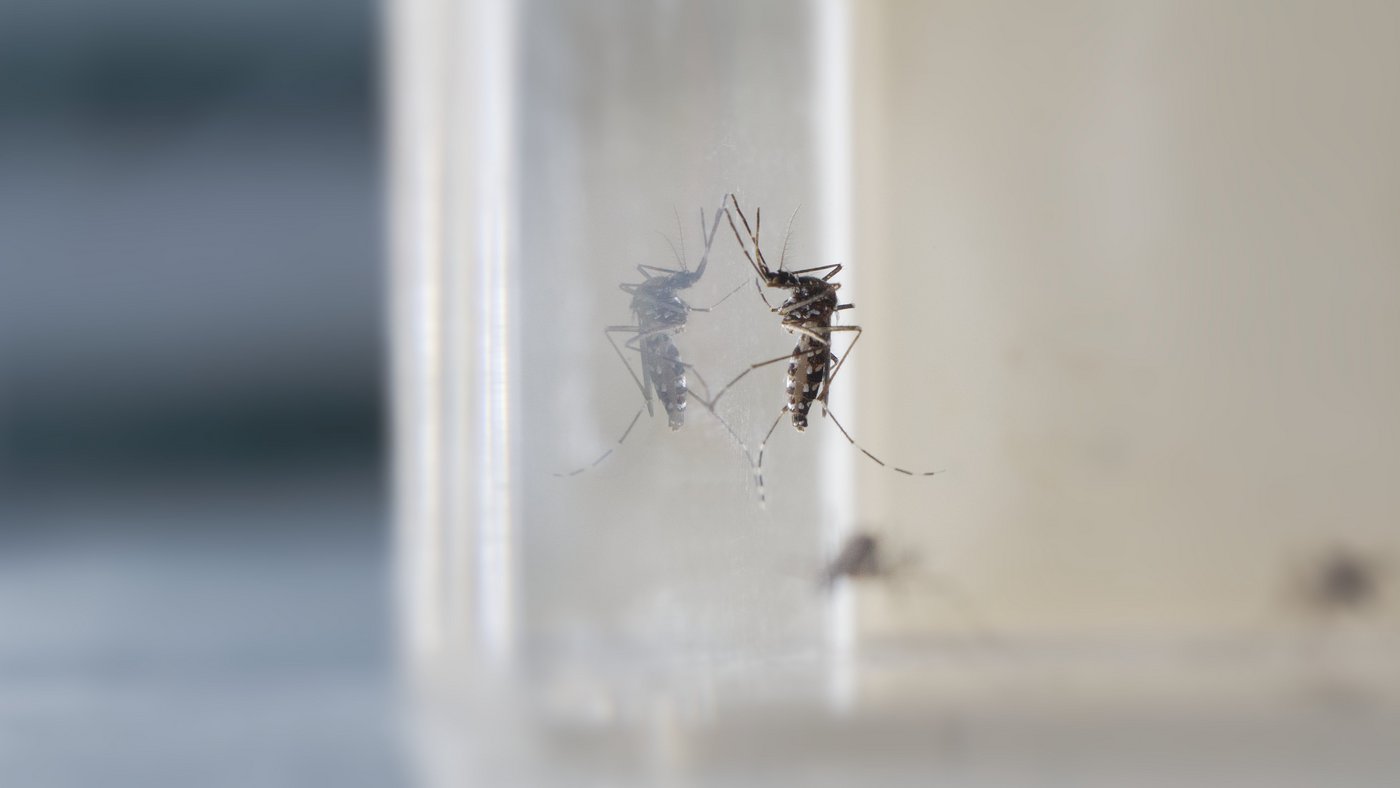World Mosquito Day: Climate change and virus outbreaks – Mosquito research more important than ever
BNITM invites the public to an information event on 4 September 2025
On World Mosquito Day, the Bernhard Nocht Institute for Tropical Medicine (BNITM) is drawing attention to an urgent question: What dangers do mosquitoes pose in Germany in times of climate change? BNITM researchers investigate which species are becoming established, which pathogens they can transmit and how artificial intelligence can help monitor their spread. On 4 September 2025, the BNITM will be inviting the public to learn more about this research and engage in conversations with experts.

Rising temperatures, milder winters and changing precipitation patterns are enabling mosquito species originating from warmer regions to become established in Germany. This also increases the risk of pathogens such as dengue, chikungunya and West Nile viruses gaining a foothold here.
"Climate change is altering the rules of the game. Mosquito species are spreading, bringing with them pathogens that were previously rare in this area," says Prof Dr Jonas Schmidt-Chanasit, head of the Department of Arbovirology and Entomology at the BNITM. “Early warning systems and control are therefore crucial.”

Current research findings from the BNITM
In recent months, BNITM scientists have published several groundbreaking studies showing how climate change is affecting mosquitoes and the pathogens they transmit, and how new technologies can help monitor and influence their spread.
The Asian tiger mosquito (Aedes albopictus), an invasive species, has already established itself in southern Germany through travel and climate change. Dr Anna Heitmann and her team were able to show in a study that the chikungunya virus can even multiply in the tiger mosquito at low temperatures. However, the tiger mosquito hardly flies in such cold conditions, which significantly reduces the actual risk of infection.
The Tahyna virus, a virus found in Europe that can cause flu-like illnesses, is transmitted at high temperatures by Aedes albopictus and the native mosquito Aedes rusticus.
In addition, BNITM researchers were able to show that the invasive species Aedes japonicus, which has already established itself in Germany, could transmit alphaviruses such as the Sindbis virus and the western equine encephalitis virus. In this study, the researchers also looked at coinfections with insect-specific viruses that cannot infect humans. This is because the transmission of viruses to humans is influenced not only by temperature; coinfections in mosquitoes also play a role.
A recently published study shows that Aedes albopictus can transmit the Oropouche virus, previously known mainly from South America, at higher temperatures, albeit to a limited extent. In the wake of global trade and travel, there remains a risk that the Oropouche virus could be introduced and, under certain conditions, transmitted in our region.

An important component of global early warning systems is the use of artificial intelligence (AI) in mosquito identification. BNITM scientists focused on the wings of mosquitoes: they created a wing image database and trained neural networks to quickly and automatically recognise mosquito species based on their unique wings.
"AI can help us identify mosquitoes more quickly and reliably – even in places where there are few experts or traditional methods have reached their limits," says Kristopher Nolte, a doctoral student in the Vector Control group. "Only if we know which mosquitoes occur where and what they can transmit can we respond in time."
Invitation to an information event on mosquito research on 4 September 2025
On Thursday, 4 September 2025, the speakers will provide insights into the history of mosquito research and current projects at BNITM:
- Dr Renke Lühken, Head of the Arbovirus Ecology and Vector Control Group, will look back at the history of mosquito research at the BNITM – from the founding of the Entomology Department in 1912, through the eradication of malaria in Germany, to the widespread spread of mosquito-borne viruses in the 21st century.
- Dr Anna Heitmann, head of a laboratory group and arthropod breeding facility at BNITM, will report on her work in a BSL-3 insectarium and how she tests which viruses native and invasive mosquitoes can transmit.
- Kristopher Nolte, a doctoral student in the Vector Control group, will present an AI-supported method that automatically identifies mosquito species.
The event will be held in German. It is open to anyone interested. In addition to presentations, there will be an opportunity for questions and discussions with the researchers.
Date: Thursday, 4 September 2025, 6–8 p.m.
Location: BNITM's historic lecture hall, Bernhard-Nocht-Straße 74, 20359 Hamburg
Admission: free
Further information and registration: https://www.bnitm.de/aktuelles/veranstaltungen/bnitm125-forschen-heilen-lehren-2025
Publications
Jansen S.*, Lühken R.* et al. “Risk assessment of Oropouche virus transmission by mosquitoes in Europe.” The Journal of Infectious Diseases 2025 (*shared first authorship)
World Mosquito Day
World Mosquito Day is held every year on 20 August to raise awareness of the dangers posed by mosquitoes. There are more than 3,500 species of mosquitoes worldwide. Many of them can transmit pathogens to humans, such as the malaria parasite, dengue, Zika, chikungunya viruses and many more. World Mosquito Day aims to raise awareness of the importance of researching these diseases and their transmission mechanisms. It also urges action to curb the spread of mosquitoes.
The day commemorates 20 August 1897, when British physician of tropical medicine Sir Ronald Ross proved that the malaria parasite is transmitted by female mosquitoes of the Anopheles genus. This not only revolutionised malaria research and control. His findings are still fundamental today for our understanding of epidemics that originate from insects. In 1902, Ross was awarded the Nobel Prize in Medicine or Physiology.
Downloads
Contact person
Dr Renke Lühken
Group Leader Arbovirology Ecology
Phone : +49 40 285380-862
Email : luehken@bnitm.de
Dr Anna Heitmann
Research Group Leader
Phone : +49 40 285380-832
Email : heitmann@bnitm.de
Prof. Dr Jonas Schmidt-Chanasit
Head of Arbovirology/ Entomology Department
Phone : +49 171 212 7900, +49 40 285380 271
Email : schmidt-chanasit@bnitm.de
Dr Anna Hein
Public Relations
Phone : +49 40 285380-269
Email : presse@bnitm.de







